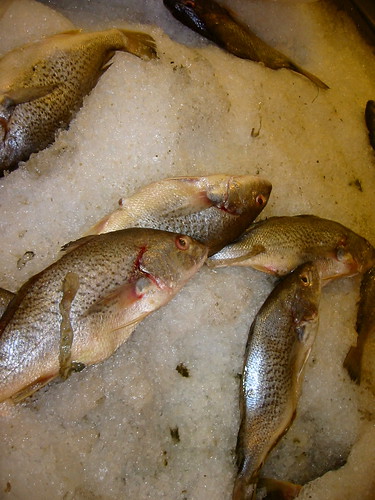
Some Fish
One hardly believes William Logan’s “Up Front” squib in the 29 June 2008 New York Times Book Review that “there are moments, when writing criticism, when I’d rather be writing poetry—I can’t say I’ve ever found it the other way around.” For what he relishes is the clever jab, critical writing reduced to a series of ho-ho zingers whilst it skitters here and there like a crawfish, backpedaling, leaving a slurry of wayward and incomprehensible tracks, effaced (he wagers) by each subsequent crack. Logan’s poems, in comparison: listless, spindly, overgrown and -work’d hothouse things. Consider the review of the new Mark Ford-edited Selected Poems, by Frank O’Hara, a book one shrugs off as mere re-packaging, wondering why it’s needed, what with the Collected available, and the 1974 Donald Allen Selected, still plenty serviceable. (I notice of late a pattern of such mercenary pickings along the pike: I think of FSG’s recent Micahel Almereyda-edit’d Night Wraps the Sky: Writings by and about Mayakovsky, a scrapbook, with a fine stash of photographs, here and there poems and snippets, packaging for the age of disorder’d attentions.) Logan’s review moves dartingly: after calling O’Hara “a poet whose genius shone as intermittently as a firefly” (a perfectly ignorant remark: male fireflies “shine” bioluminescently at variable rates, flying in search of female mates. Periods of spontaneous synchronicity occur—whole hundreds in a field flashing in unison. On a hot and busy summer night—up to fifty or so light ups (blinks) per hour can by observed—reminding one of the golden years of cigarette consumption in the Cedar Tavern . . .)
Logan generally proceeds with the archest of manoeuvres, attempt’d pummeling by one-liners. O’Hara sounds like “Wallace Stevens at the soda fountain”; he’s “elated as an eel” (?); he scatters “exclamation points like penny candy”; O’Hara’s lines are “broken like breadsticks” (?); he want’d the poems to look “easy as a sewing machine” (?); O’Hara’s genius was “to stop trying to have a point” (a little like re-packaging “Selecteds”); one poem “sounds like Ezra Pound on happy pills.” Showy lines, mostly; on examination, idiotic. (Why say lines “broken like breadsticks”? What could that possibly mean or add to anything? One supposes Logan’s proceeding by sound, music—br, br—something I mightily “counsel”—here it simply clunks, queerly inept. Logan tries (repeatedly) to kill two birds with one stone: riddles the “piece” with innuendo, slights to the left, slights to the right. So, “late Ashbery” gets a smack-down—the “insouciant nonsense” he made into a “charming anti-literary manner” is compared to something “O’Hara soon grew bored with.” So the minor school of stand-up comics (the perfectly harmless Billy Collins-infect’d glad-handers and wits; in another “age” they’d be the genial bonhommes of stereo showrooms) get they minor comeuppance: “O’Hara never condescend to the reader, unlike some slapstick poets now.” Allen Ginsberg, in a gratuitous aside, proves “slightly lugubrious about sex.” The poor bloggers, too, associated with O’Hara’s purport’d “preoccupation with the trivial, with the nothing of life that is nothing” (?), get blast’d for good measure: since O’Hara “began to make poetry from whatever happened around him”—“today, he might have written a blog.”
Considering Logan’s history of critical writing, any “use” of him by an editor can only be calculated (the man’s probably never written a wholly favorable review—“we’re looking for a hatchet job”) or cynical (“summer’s slow—how about a controversial hit man to boost the readership a little”) or both. One of Logan’s problems is that he apparently’s got no ear whatsoever for tongue-in-cheekiness, or cheekiness tout court. He reads the back cover copy of Lunch Poems (almost assuredly written by O’Hara himself) wherein the poet’s seen “strolling through the noisy splintered glare of a Manhattan noon” only to pause “at a sample Olivetti to type up 30 or 40 lines of ruminations” and straight-facedly declares it “most unlikely.” Worse, he repeats O’Hara’s terrific bathos-on-high lines of how the Lunch Poems author ’d “withdrawn to a darkened ware-or firehouse to limn his computed misunderstandings of the eternal questions of life” as if it record’d a method (“as close to an ‘Ars Poetica’ as the poet ever made.”) Illiteracy and dunderheadedness raised up to a method.
What Logan fails to perceive about O’Hara shows up early when, stage-setting, he reports on the “heady atmosphere of postwar Manhattan” where “young poets holstile to the philistines surrounding them . . . envied the technical bravado and rebellious invention of the Abstract Expressionists.” Envy replaces admiration in Logan’s universe: all is struggle and strife, with others and with words. He makes much of the importance of labor (both its necessity and the necessity it be, finally, unseen, hid—a peculiar combo), sign of a poem’s authenticity, quoting Yeats’s “A line will take us hours maybe / Yet if it does not seem a moment’s thought, / Our stitching and unstitching has been naught.” It’s a Puritanical axiom, one even the laziest of the “post-avant” like to edict and decree.
I suppose the crux of Logan’s problem is in the remark that O’Hara and buddies “seemed to jettison everything—meter, the calculated symbol, the grave poetic tone—associated with the manners of the art.” Astounding that “gravity” ’d make an appearance, or “manners.” Logan is presumably concern’d with “the art” only as it conceivably exist’d in some drawing room in late Victorian or Edwardian London for a period measurable with something considerably less than Eliot’s “coffee spoons.” Sour-mind’d prestidigitations of a pre-modernist. The Times ought to be ashamed.

Frank O’Hara, 1958
(Photograph by Harry Redl)
(Photograph by Harry Redl)